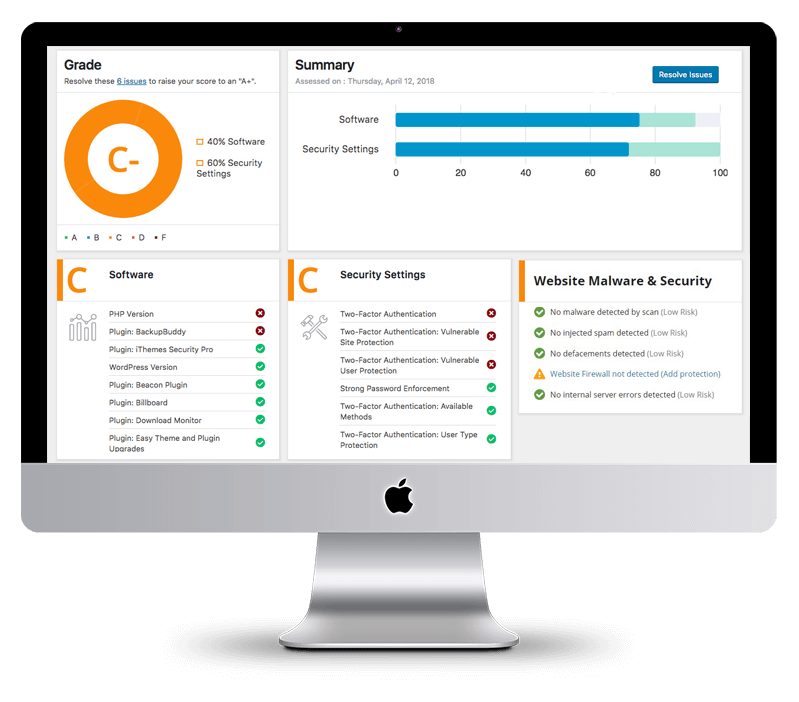With thousands of attacks reported every minute, brute force attacks are a very real threat to your website and can disrupt your business making you lose valuable data. Knowing how they occur is key to protecting yourself.
There are two ways brute force attacks are typically carried out: 1) through the use of bots or 2) through direct human action (for example: trying to predict username and password combinations). In either case, you must learn how to protect your WordPress Website from brute force attacks.
If you’re confused by the difference between brute force attacks and DDoS attacks, you’re not alone. Simply put, a DDoS attack (Distributed Denial of Service attack) is aimed at pushing multiple requests simultaneously to essentially crash your website. On the other hand, a brute force attack is aimed at gaining access to your website on a large scale. A side effect of a brute force attack is that it can crash your website as well (which is where the confusion comes into play).
Securing your WordPress Website
Hog the Web employs corporate-grade security technology to protect your WordPress assets from unauthorized access and brute force attacks.
While there are plugins you can use to try and protect your website, there are considerable drawbacks. Below are some of the reasons why we do not recommend the use of firewall plugins:
- Flooded inboxes: When you authorize a function that limits access to your website, or that tracks any file changes, the site administrator can expect way too many emails in their inbox. This massive influx of emails can be overwhelming and cause important warnings to go unnoticed.
- SEO problems: Often times these plugins will secure your website by completely hiding it from bad, and good traffic causing issues with the efficacy of SEO efforts.
- They can lock you out: Most cases of intrusion happening to WordPress sites are often caused by failure to change the default password and username combination. Plugins limit access to your site using common combinations such as username “admin” and passwords like, “password.” In fact, they may as lock out genuine users.
- Plugins can cause inconvenient permanent changes: It is easy to assume that plugins are designed to make our lives easier. The truth is that they sometimes effect changes to content in the WP-content directories that end up costing time and money.
- The requirement for personalized support: Any security tool requires personalized attention, however, many plugins are not continuously supported. Therefore, users may find themselves in a situation where a problem arises with the plugin, but there are no technicians to assist them.
How our Firewall works
As there are many ways criminals can attack your website and implement brute force attacks, we use a combination of techniques to detect malicious attacks efficiently and effectively. Hog the Web uses a modern firewall designed to protect your back-end systems from internet threats.
Our research indicates that nearly 30% of all traffic hitting your website is from the bad guys.
Our firewall uses a sophisticated algorithm to detect and halt any and all malicious activity that can compromise your website, while ensuring all good traffic can still reach your site. We also employ a Content Delivery Network (CDN) through our firewall to speed up your site’s response.
We recognize the valuable asset that a firewall is in the business of protecting your website against brute force attacks. Our firewall allows access to your website based on a set of rules that govern how traffic to and from your website is managed. We also make use of algorithms that actively analyze traffic in order to separate trusted sources from suspicious ones. We only allow trusted users to reach the back-end of your website.
Overall, we use three key strategies to manage security:
Filtering: We have developed extensive filters to analyze, classify, and categorize data packets directed towards your website.
Proxy connection: Hog the Web’s firewalls stand in between the vast depths of the internet and your website’s assets. We only allow traffic that has passed through our filters to reach your site.
Inspection: We make use of intelligent learning tools to look for patterns that identify malicious behavior. This technology allows us to accelerate identification of nasty users and maintain an efficient response time.
Why Use Hog the Web’s Firewall for WordPress
WordPress security is complicated, but we have done some amazing work in creating a tool that expedites the process of identification of malicious attacks. Our approach effectively hardens your website and keeps you prepared for possible attacks. We understand that there is no such thing as perfect security. Our job is to minimize your risk of exposure using:
- Collective protection: Hog the Web’s security tools effectively block common exploits used by hackers such as Blackhole Exploit toolkit. We continuously identify new tools and disable them.
- Evaluating risks: Many people would like to assume that their websites are secure but that is rarely the case. Understanding that it takes only a few weeks between deployment and initial attacks will help you make better security decisions. There are millions of botnets in use by hackers that scout for vulnerable sites all the time. We use an extensive resource of threats to create WAF rules that safeguard your internet assets from brute force attacks. Your organization can then focus on improving the customer experience without worry about security.
- Cloud approach:. Hog the Web uses this vast resource to manage the security of your websites and APIs, reducing the load on your web hosting server resources. Our website backups are stored securely on the Amazon S3 cloud servers, and our firewall servers are distributed around the globe to ensure the fastest and most stable connection.
Interested in learning more about our Security Services? Check out our various Website Security and UpKeep plans here.

Levi is the Founder & CEO of Hog The Web, a web design and WordPress services company delivering high-performance websites since 2015. With over a decade of hands-on experience in building, maintaining, and securing websites, Levi leads his team with a focus on craftsmanship, reliability, and long-term client partnerships. Outside the web world, he’s passionate about nature, sustainable living, and giving back through local non-profits and youth education.




